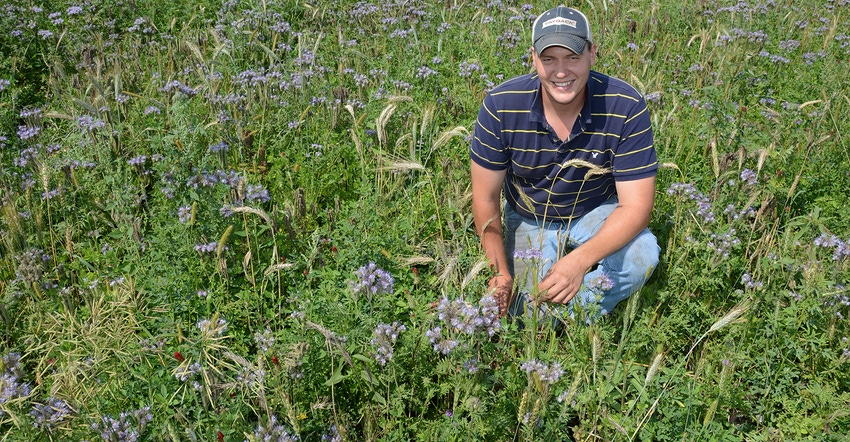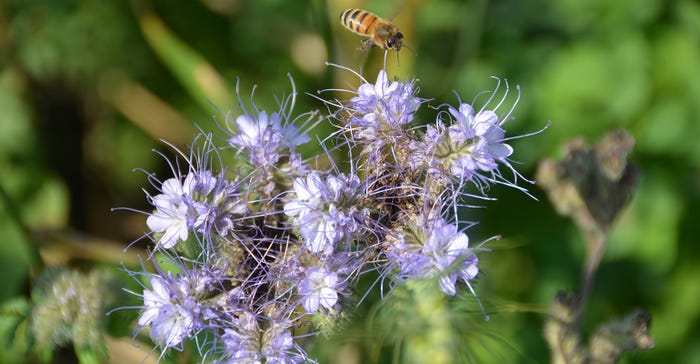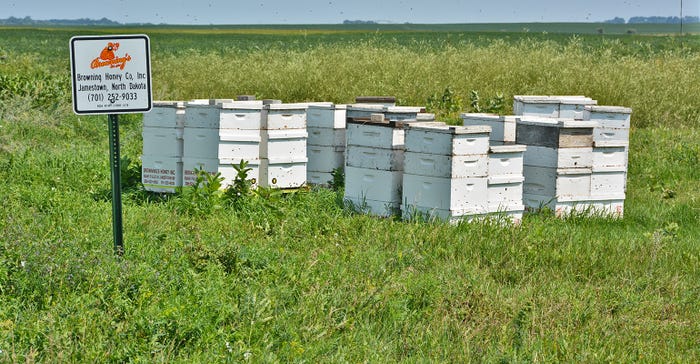August 31, 2017

Kasey Bitz is getting into the buzz of bees on his family’s farm. Bitz, LaMoure, N.D., teamed with Browning’s Honey, of Jamestown, N.D., to see what they could do together to improve bee health and boost honey production.
Bitz provided a place for Browning’s Honey to put hives on the farm and planted 13 acres of bee forage and butterfly habitat. He also stays in close touch with Browning’s Honey. He checked with them when he was ready to spray an insecticide on nearby crops, and he didn’t spray when the bees were actively foraging. However, he didn’t have to change the type of seed treatment he used because the hives weren’t moved to the farm until well after all the crops were planted.
 BEE FORAGE: Bees gather nectar from the Angelia phacelia blossom.
BEE FORAGE: Bees gather nectar from the Angelia phacelia blossom.

“I have enjoyed being around the bees and learning about them,” Bitz says. “Browning’s Honey has let with me watch when they check the hives and honey.”
Bitz and Browning’s Honey are one of four pairs of farmers and beekeepers in North Dakota who are part of the new Bee Integrated Demonstration Project sponsored by the Honey Bee Health Coalition. The project involves establishing pollinator forage, monitoring and treating bees for Varroa mite infestations, and following pollinator protection plans and best practices for crop pesticide use.
"Bee Integrated is a groundbreaking, real-world demonstration of how best management practices can help address the numerous challenges honeybees face," says Julie Shapiro, facilitator of the Honey Bee Health Coalition and a senior policy director at the Keystone Policy Center, Denver, Colo.
It is supporting farmer-beekeeper pairs with expert guidance and resources; measuring the results of the pairs’ work; and sharing the findings and lessons learned with the broader beekeeping and farming communities.
 HOME FOR HIVES: Browning’s Honey placed hives on the Bitz farm as part of the Bee Integrated project.
HOME FOR HIVES: Browning’s Honey placed hives on the Bitz farm as part of the Bee Integrated project.

“There are many factors that impact pollinators, and the Honey Bee Health Coalition Bee Integrated Demonstration Project brings together various experts — from beekeepers and farmers to scientists and technology providers — to create solutions for the challenges pollinators face,” says Keri Carstens, DuPont Pioneer Seed Treatment Enterprise, senior manager for Integrated Product Research and Stewardship. “This integrated approach ensures that we’re working holistically toward a sustainable, positive solution, which is why DuPont is a proud sponsor of the Bee Integrated Demonstration Project and the Honey Bee Health Coalition.”
Funding and in-kind support for the project is provided by the Almond Board of California, The Bee and Butterfly Habitat Fund, Bayer CropScience’s Healthy Hives 2020 program, the National Honey Board, the North Dakota Outdoor Heritage Fund, the North Central IPM Center, DuPont Pioneer, Eastern Missouri Beekeepers Association, Syngenta and the Honey Bee Health Coalition.
Project coordination is being provided by Conservation Technology Information Center. Monitoring is being provided by the Bee Informed Partnership and U.S. Geological Survey.
Working together
Working with beekeepers to protect hives and increase bee health fits Bitz’s idea of how farmers should work together — no matter what their enterprise.
“Agriculture isn’t that big,” says Bitz, who is a member of the North Dakota Soybean Association board of directors and chairman of the North Dakota Farmers Union Policy and Action Committee. “We need to be united and work together for the good of everyone.”
The Honey Bee Health Coalition plans to involve more farmer-beekeeper pairs in the project in the future.
Learn more at honeybeehealthcoalition.org.
You May Also Like




